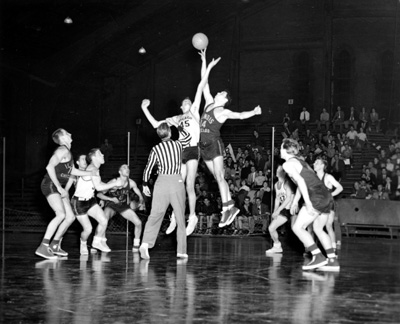 From
our pages
From
our pages
1913
An April article examined the system for placing freshmen
into English classes. Everyone registered for the quarter-long
English I, but to stay in the class students had to prove
their ability during a trial week. Those with major writing
problems, such as the student who wrote, “I have herd
graduates of the University of Chicago say…that the
teachers here where the best money could hire,” were
placed in English 0, where their money hired not University
of Chicago teachers but rather University High School instructors.
If they improved they moved up to English I the next quarter,
while students who performed exceptionally well received
credit for English I at quarter’s end.
 Photo Credit:
University of Chicago Library Department of Special
Collections
Photo Credit:
University of Chicago Library Department of Special
Collections |
A
win at last: after the tipoff, the Maroons made the
first basket and never fell behind (1953).
|
1953 With
the men’s basketball team nearing a 46-game losing
streak, students organized a giant rally to give the team
the enthusiastic support it didn’t regularly receive.
Before the February 11 game against the University of Illinois
Navy Pier team, which had already beaten the Maroons once
that year—and after consulting the director of student
activities on how to organize a rally—students marched
around campus carrying torches, flares, and signs proclaiming
“Sink the Pier.” Pumped, the basketball five
pulled through, beating Navy Pier 65–52. The team,
however, resumed its losing streak in its next (and rally-less)
game.
1978 An
associate professor and a doctoral student in human development
argued that American culture was not as materialistic as
many thought. The authors interviewed hundreds of Chicagoans
in different age groups about their “most special
objects,” asking what they would pass on to their
children or save in a fire. Children named pieces of furniture,
stereos, and TV sets most often; parents chose furniture,
paintings, and books; and grandparents picked photographs,
books, and paintings. The researchers concluded that while
many Americans owned objects of great financial value, their
most prized possessions were objects that “are important
because of their personal meaning, not just because of their
exchange value.”
1993 April’s
“Chicago Journal” reported a 4.5 percent increase
in College costs. Tuition for 1993–94 was set at $17,910,
room and board $6,130, and health-services and student-activities
fees totaled $297, compared to the 1992–93 figures
of $17,061, $5,940, and $285. Also going up were funds for
financial aid, with $23.2 million earmarked for undergrad
scholarships—a $1.8 million jump from the previous
year. This April 2003–04 tuition was set at $28,689—more
than $4,000 over 1993–94’s total costs. Room
and board will be $9,165. Bottom line: total costs are up
56 percent over 1993–94.
—D.G.R.


![]() Advertising
Advertising
![]() About
the Magazine
About
the Magazine ![]() Alumni
Alumni
![]() UChicago
UChicago
![]()
![]() ©2003 The University
of Chicago® Magazine
©2003 The University
of Chicago® Magazine ![]() 5801 South Ellis Ave., Chicago, IL 60637
5801 South Ellis Ave., Chicago, IL 60637![]() fax: 773/702-0495
fax: 773/702-0495 ![]() uchicago-magazine@uchicago.edu
uchicago-magazine@uchicago.edu
